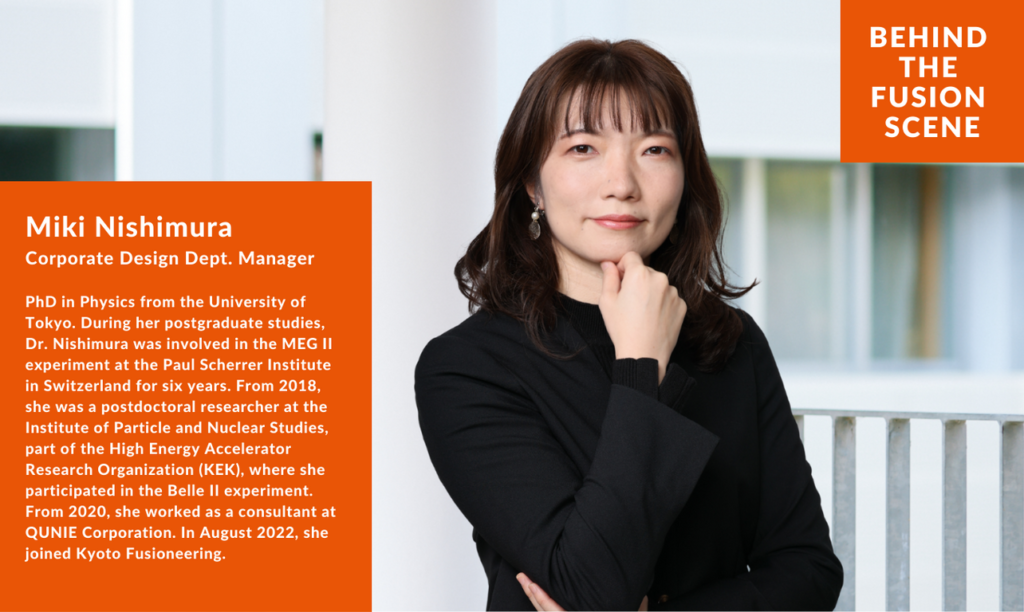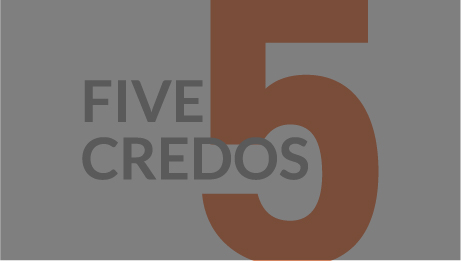
Miki Nishimura, Corporate Design Dept. Manager
PhD in Physics from the University of Tokyo. During her postgraduate studies, Dr. Nishimura was involved in the MEG II experiment at the Paul Scherrer Institute in Switzerland for six years. From 2018, she was a postdoctoral researcher at the Institute of Particle and Nuclear Studies, part of the High Energy Accelerator Research Organization (KEK), where she participated in the Belle II experiment. From 2020, she worked as a consultant at QUNIE Corporation. In August 2022, she joined Kyoto Fusioneering.
What interested you in science?
An initial spark of interest in science came from my father. When I was a child my father used to tell me and my sister all sorts of stories, and I enjoyed it so much. Since I used to ask him a lot of questions, one day he said to me, “Miki, you are very curious, so being a scientist will suit you!” And that’s when I first became interested in becoming a scientist.
After that, I was interested in various fields, such as space and life sciences. Eventually, I was most interested in the nature of things, so I started to study physics seriously from high school.
At university, I wanted to go to a graduate school that suited my career path as a scientist, so I studied towards that goal. In postgraduate school, I joined a particle physics laboratory and worked on the MEG II experiment at the Paul Scherrer Institute in Switzerland. Although I was already involved in the research as a postgraduate student, I was deeply moved when I really achieved my dream by becoming a postdoctoral researcher, because I had set the criterion for whether I could become a scientist as whether I could make money from my research.
How did you decide to shift from being a researcher to working in a private company?
When I was finally able to fulfil a dream, I wondered if I really wanted to continue to do only research in this industry. My father used to tell me that I was curious, but I realised that my curiosity was more about finding out new things that I didn’t know yet, rather than to deepen the understanding of what I already knew. I began to consider trying out the persistence and exploratory spirit towards things that I had developed in my previous research, not just in one area, but in multiple fields.
I then started to look for options to work in a private company, but at that time I did not feel like choosing a research position in a company, since I was leaving my postdoctoral fellowship. One day, I attended one of the career forums, and I discovered that consultancy positions were available for PhD holders.
After being in the same world for nearly eight years at postgraduate school, consultancy work was attractive because it offered a broader view of the industry. I found a job in consulting where I could make use of the data analysis skill, I had developed in my research career. When I actually started working, I really enjoyed the job because I could see data from many different companies and learn how to make use of that data in the different environments, I had experienced.
What made you join KF?
I found consultancy work stimulating and felt that it satisfied my intellectual curiosity. However, I felt that it was difficult to feel the same sense of unity with the project members as I did during my research days, because my employer was involved as an external consulting expert on some defined projects within the client business.
I also felt that while I could be involved in solving problems for various companies, there were few opportunities to get involved in the vision and mission parts of the business. I wished to work for a company whose vision I could share and where I could think about the company’s issues as my own and execute projects with my colleagues, and I found Kyoto Fusioneering.
To be honest, I never expected to go into a start-up business, and I had considered many different companies before deciding to join Kyoto Fusioneering. I decided to join Kyoto Fusioneering because I felt that the vision of creating new energy through nuclear fusion was overwhelming, unique and very romantic.
I was also attracted to Kyoto Fusioneering by the closeness between the business and technical teams. Kyoto Fusioneering also offered the possibility of being involved in research and development, contrasting with the data scientist positions I had done to date. I think I also missed the atmosphere of academia and manufacturing a bit, where we had to build up the world’s most advanced technology ourselves step by step.
What projects are you currently working on at KF?
At the moment I’m involved in several technical and business projects and discussing with members which areas I will focus on.
Personally, I would like to be actively involved in R&D process of actually making things. During my career, I have consistently found it interesting to understand some phenomena with data analysis and therefore, I would like to contribute to the development of a deep understanding of data in R&D.
How do you see KF changing over the next five years?
Personally, I hope to develop a company that is known in Japan and around the world as the experts in nuclear fusion.
Our business focus will shift towards more global activities in the future. Through that journey, I would like to accentuate the fact that we are a global company originating from Japan. This is because, when I myself have been involved in international joint research projects, there have been many moments when I have felt the need to recognise the strengths of each participant. Equally, I have found it necessary to be assertive and not reserved on important topics.
I personally hope that because Kyoto Fusioneering possesses certain technologies originating in Japan, we can show strong leadership in the international field and establish a presence that will be respected both domestically and internationally.
What would you like to achieve with KF?
I have two goals. One is to use my expertise area to contribute to the overall design of the fusion plant. There are many possibilities in the digital domain for the fusion reactor implementation, such as factory management and digital twinning*, and I feel that I still have a lot to learn. I would be happy if I could say “I made this part of this system” for equipment that is actually implemented in a future fusion plant.
The other is that I would like to become an expert in energy issues myself, so that I can represent Japan internationally and provide suggestions on energy issues. The vision is to develop a recognised expertise in this area, such as providing insights as an expert on fusion-related news in the media.
*Digital Twin: An initiative to design and optimise fusion reactors by simulating them on a virtual basis.
■For further information visit our recruitment page.
■Previous Leadership Thoughts can be found here.




